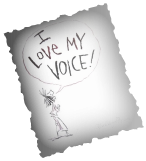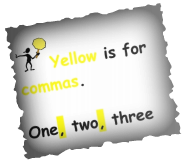Rhyming Words.....
Check this website for rhyming words.
http://www.poetry4kids.com/rhymes
Six Traits of Writing
Info taken from Creative Writers! 1998. Developed by Vicki Spandel.
Language to look for....
IDEAS: ORGANIZATION: VOICE:
Content Structure Tone
Focus Logic Style
Originality Flow of Ideas Flavor
Clarity Order Sensitivity to Audience
Meaning Transitions Awareness to Audience
Accuracy Sequencing Energy
Detail Lead Readability
Knowledge of Topic Conclusion Expressiveness
Insight Beginning, Middle, End Enthusiasm for Topic
Vivid Writing Readability
Audience Appeal IndividualityPERSONALITY!
Language to look for....
IDEAS: ORGANIZATION: VOICE:
Content Structure Tone
Focus Logic Style
Originality Flow of Ideas Flavor
Clarity Order Sensitivity to Audience
Meaning Transitions Awareness to Audience
Accuracy Sequencing Energy
Detail Lead Readability
Knowledge of Topic Conclusion Expressiveness
Insight Beginning, Middle, End Enthusiasm for Topic
Vivid Writing Readability
Audience Appeal IndividualityPERSONALITY!
WORD CHOICE: SENTENCE FLUENCY: CONVENTIONS:
Wording Sentence Structure Spelling
Vocabulary Sentence Variety Punctuation
Phrasing Grammar Grammar
Expression Smooth flow Capitalization
Definition of Key Terms Paragraph placement
Terminology
Accurate Use of Words
Conciseness
Avoiding of Jargon
Avoidance of Redundancy
Wording Sentence Structure Spelling
Vocabulary Sentence Variety Punctuation
Phrasing Grammar Grammar
Expression Smooth flow Capitalization
Definition of Key Terms Paragraph placement
Terminology
Accurate Use of Words
Conciseness
Avoiding of Jargon
Avoidance of Redundancy
IDEAS....
Click on this link for extra practice-> IDEAS ACTIVITY
1. BE AN OBSERVER.Notice the world around you. Notice what people wear, how they move, how they talk. Take close-up snapshots in your mind. Learn to see everything from rooftops to the ants on the ground. Find life interesting. Bored people write boring text. Don't let yourself be bored. Ever. Learn to see what others miss.
2. WRITE SMALL.Many people try to write about HUGE topics-achieving wolrd peace, the value of a good education, how to raise a healthy puppy. Forget it. Big topics are boring because they aren't specific. For example, "people with good values make the best leaders".Statements like this seem to say something, but really say nothing! Write small. VERYsmall. Then you can say things that are specific, individual, and interesting. Here are some little topics:
*Is it important, really, to be popular?
How to make conversation when you have absolutely nothing to say
Can anyone be a poet?
What's the most annoying thing about computers?
Why do some people enjoy crowds?
Are dogs smarter than cats?
If you looked through someone's garbage, what could you tell about that person?
Does someone's personality come through in an e-mail or text message?
How to pick a great pair of shoes
These are just ideas! You don't have to choose any of these. Don't, in fact! Come up with a list of your own!
3. PICK YOUR OWN TOPICS. This is what real writers do. Unless you're writing in response to a specific assignment to demonstrate content knowledge...for example...how gravity relates to the weight of falling objects...there is no reason for all writers in the class to huddle compulsively around the same topic writing identical papers. Be original!
4. GET RID OF DEADWOOD. Separate the good details from the snoozers. Suppose you're writing about viper fish. You could write that they live in the ocean, but is that NEWS? Come on! What ISN'T so obvious is that they live so deep in the ocean there is no light. Think of it. No light at all. What would you do if you lived in a place where there was no light and suddenly, you saw a light? You'd go toward it, right? That's what other fish do too! That's how viper fish catch their prey. They tempt them with light generated from their own bodies. That's an ingtriguing detail, one readers will care about. Now you've turned a boring encyclopedia entry into a kind of underwater horror story!
5. DON'T TRY TO TELL TOO MUCH! Think of writing as a kind of home movie on paper. You know how home movies are. You don't want to see EVERYTHING about the neighbor's trip to Sheboygan, do you? Starting with the packing...good grief, how long will this movie take? Where's the exit? Pretend you had to do Sheboygan in six minutes flat. Write like that! CHOOSE ONE MAIN THEME, ONE MAIN POINT TO MAKE, ONE OR TWO SIGNIFICANT QUESTIONS TO ANSWER, AND KEEP IT FOCUSED. Get to the point! Then, get out. Stop! Got more to say about sharks...or cats...or turtles...Great! Save it for next time!
6. DON'T GENERALIZE. Words like, good, exciting, fun, special, and nice say nothing.They're really worse than nothing because they're annoying.They make your readers do all the work.So, instead of saying...We had a fun time on our camping trip...say...I found out I could be four feet from a bear and not die of fright! In your head, picture a little guy, little nuisance of a guy, about one foot high, hopping up and down right by your keyboard. And he says...what do you mean by that? No matter what you write, that's what he asks you. Answer him, and keep answering him, until you can't do it anymore, until you can't get one bit more specific. @
2. WRITE SMALL.Many people try to write about HUGE topics-achieving wolrd peace, the value of a good education, how to raise a healthy puppy. Forget it. Big topics are boring because they aren't specific. For example, "people with good values make the best leaders".Statements like this seem to say something, but really say nothing! Write small. VERYsmall. Then you can say things that are specific, individual, and interesting. Here are some little topics:
*Is it important, really, to be popular?
How to make conversation when you have absolutely nothing to say
Can anyone be a poet?
What's the most annoying thing about computers?
Why do some people enjoy crowds?
Are dogs smarter than cats?
If you looked through someone's garbage, what could you tell about that person?
Does someone's personality come through in an e-mail or text message?
How to pick a great pair of shoes
These are just ideas! You don't have to choose any of these. Don't, in fact! Come up with a list of your own!
3. PICK YOUR OWN TOPICS. This is what real writers do. Unless you're writing in response to a specific assignment to demonstrate content knowledge...for example...how gravity relates to the weight of falling objects...there is no reason for all writers in the class to huddle compulsively around the same topic writing identical papers. Be original!
4. GET RID OF DEADWOOD. Separate the good details from the snoozers. Suppose you're writing about viper fish. You could write that they live in the ocean, but is that NEWS? Come on! What ISN'T so obvious is that they live so deep in the ocean there is no light. Think of it. No light at all. What would you do if you lived in a place where there was no light and suddenly, you saw a light? You'd go toward it, right? That's what other fish do too! That's how viper fish catch their prey. They tempt them with light generated from their own bodies. That's an ingtriguing detail, one readers will care about. Now you've turned a boring encyclopedia entry into a kind of underwater horror story!
5. DON'T TRY TO TELL TOO MUCH! Think of writing as a kind of home movie on paper. You know how home movies are. You don't want to see EVERYTHING about the neighbor's trip to Sheboygan, do you? Starting with the packing...good grief, how long will this movie take? Where's the exit? Pretend you had to do Sheboygan in six minutes flat. Write like that! CHOOSE ONE MAIN THEME, ONE MAIN POINT TO MAKE, ONE OR TWO SIGNIFICANT QUESTIONS TO ANSWER, AND KEEP IT FOCUSED. Get to the point! Then, get out. Stop! Got more to say about sharks...or cats...or turtles...Great! Save it for next time!
6. DON'T GENERALIZE. Words like, good, exciting, fun, special, and nice say nothing.They're really worse than nothing because they're annoying.They make your readers do all the work.So, instead of saying...We had a fun time on our camping trip...say...I found out I could be four feet from a bear and not die of fright! In your head, picture a little guy, little nuisance of a guy, about one foot high, hopping up and down right by your keyboard. And he says...what do you mean by that? No matter what you write, that's what he asks you. Answer him, and keep answering him, until you can't do it anymore, until you can't get one bit more specific. @
ORGANIZATION....
Click on this link for extra practice-> Organization Activity
1. SPEND TIME ON A GOOD LEAD.It's worth it.This is how you hook your reader, and you get three seconds to do it-that's it.Create a scene.Think of it as an opening scene in a play...the curtains open...and then...Here's the thing: Most writing, from stories to business letters to persuasive essays, is written to solve a problem or answer a question. Get the issue out there right off the bat! Get your audience tuned in..and never...NEVER...repeat the assignment in the opening.For example, 'You have asked me to write about a favorite place, and I have chosen New York'...That doesn't work! Ever! And for Pete's sake, NEVER start a paper with a one word answer like you're responding to a question or filling out a form...For example, 'New York'...what's that supposed to mean? Your teacher...the one who gave you the assignment...might figure it out. Any other readers will be clueless. Remember, a good paper isn't just an answer to an assignment, it has to STAND ALONE! Create a scene with your opening.
2. HAVE A CENTER.Like the hub of a wheel.Can you picture it? WIth the spokes rotating out? That hub is like your focus.A main idea. A theme.It's easier to organize anything..from a party to an outfit you wear..that has a main theme.For example, how can you organiza a room if you don't know whether it's supposed to be an office, a library, a gym, or a child's room? What would go in? What gets left out? Writing is like that. You need to know the purpose..to write a business letter, make a proposal, tell a story, etc. Then, you need to know the one main thing you want to tell the reader.Sum it up in one sentence.Can't do it.Keep thinking about it until you can.When you can sum it up in one sentence, you know it well enough to make it the hub of your wheel, so everything you say will connect!
3. GATHER INFORMATION IN CHUNKS.It helps some people to write notes on note cards.That way, you can do two things: First, put things together that go together.Lay them all out on the table and actually do this.Group things.Make piles.Second, get rid of "filler"boring information, common knowledge that you don't need.Those cards, the boring cards, have to go! Don't put anything in your paper that isn't essential! No one will read it.Yes, it's painful to throw away things you've written. Don't worry. You'll get used to it.
4. TRY TO SEE A PATTERN.There are many ways to organize information.Stories are often organized by time, as are histopies and biographies, so are instructions. What makes organization work is finding a good match between the kind of writing you are doing and the pattern or structure into which you put your information.
5. LINK IDEAS TOGETHER.Ever watch a movie and find yourself saying, Who is that guy?How'd he get in here? What does he have to do with anything? Irritating, isn't it? Don't do that to your readers.Don't toss in a lot of junk that doesn't seem related to anything you're saying.Every time you write a sentence, every single time, you need to ask yourself, 'What does this have to do with the main point I'm making (or story I'm telling)?' Nothing? Toss it! Use linking phrases now and then, so readers can see how ideas are hooked together.However, Nevertheless, Because, All the same, On the other hand, TO tell the truth, Therefore, As you might guess...
6.END WITH FLAIR.Nothing squelches a good piece of writing like a weak ending.Nothing. STAY AWAY from these dead end endings...
Then I woke up and it was all a dream.
So that's my story and I hope you liked it.
There's more to tell, but I'm out of time.
Now you know three reasons I love my dog.
I really enjoyed writing this paper.
I hope you find astronomy as interesting as I do.
You could have the best paper in the world, and if your ending fades out, the whole thing turns into dust in the wind.Good endings raise a question in the reader's mind, show some new insight, leave the reader with a startling image or a surprise, or suggest a new story to come. Leave your reader with something to think about.
2. HAVE A CENTER.Like the hub of a wheel.Can you picture it? WIth the spokes rotating out? That hub is like your focus.A main idea. A theme.It's easier to organize anything..from a party to an outfit you wear..that has a main theme.For example, how can you organiza a room if you don't know whether it's supposed to be an office, a library, a gym, or a child's room? What would go in? What gets left out? Writing is like that. You need to know the purpose..to write a business letter, make a proposal, tell a story, etc. Then, you need to know the one main thing you want to tell the reader.Sum it up in one sentence.Can't do it.Keep thinking about it until you can.When you can sum it up in one sentence, you know it well enough to make it the hub of your wheel, so everything you say will connect!
3. GATHER INFORMATION IN CHUNKS.It helps some people to write notes on note cards.That way, you can do two things: First, put things together that go together.Lay them all out on the table and actually do this.Group things.Make piles.Second, get rid of "filler"boring information, common knowledge that you don't need.Those cards, the boring cards, have to go! Don't put anything in your paper that isn't essential! No one will read it.Yes, it's painful to throw away things you've written. Don't worry. You'll get used to it.
4. TRY TO SEE A PATTERN.There are many ways to organize information.Stories are often organized by time, as are histopies and biographies, so are instructions. What makes organization work is finding a good match between the kind of writing you are doing and the pattern or structure into which you put your information.
5. LINK IDEAS TOGETHER.Ever watch a movie and find yourself saying, Who is that guy?How'd he get in here? What does he have to do with anything? Irritating, isn't it? Don't do that to your readers.Don't toss in a lot of junk that doesn't seem related to anything you're saying.Every time you write a sentence, every single time, you need to ask yourself, 'What does this have to do with the main point I'm making (or story I'm telling)?' Nothing? Toss it! Use linking phrases now and then, so readers can see how ideas are hooked together.However, Nevertheless, Because, All the same, On the other hand, TO tell the truth, Therefore, As you might guess...
6.END WITH FLAIR.Nothing squelches a good piece of writing like a weak ending.Nothing. STAY AWAY from these dead end endings...
Then I woke up and it was all a dream.
So that's my story and I hope you liked it.
There's more to tell, but I'm out of time.
Now you know three reasons I love my dog.
I really enjoyed writing this paper.
I hope you find astronomy as interesting as I do.
You could have the best paper in the world, and if your ending fades out, the whole thing turns into dust in the wind.Good endings raise a question in the reader's mind, show some new insight, leave the reader with a startling image or a surprise, or suggest a new story to come. Leave your reader with something to think about.
VOICE...
Click on this link for extra practice-> Voice Activity
1. BE YOURSELF. Hokey, but true.No one has your exact voice.When you call a friend on the phone, how long does it take that person to identify you? Not too long, right? You want your writing voice to be distinctive. If you hear a song on the radio, you know at once it it's Justin Timberlake, Blake Shelton, Mozart, or Celo Green.You don't have to think about it.That's the way your writing needs to be.Fingerprints on the page. Immediately identifiable.You...the one, the only.
2. MATCH VOICE TO PURPOSE. A mystery told round the campfire with long shadows flickering all around has one kind of voice.A business letter an office sends out to recruit new clients has another.A president's state of the union address has another. An engry editorial has another.Voices come in many different flavors. What is the right voice for your purpose? Smooth and professional? Humorous? Sarcastic? Dark and mysterious? Know the sound you're going for.
3. THINK OF YOUR AUDIENCE.Who are they? Write right to them. Picture them sitting listening to you.Imagine you're reading this piece aloud. Is anyone listening? How about the guy in the back row? Is he falling asleep? Are you losing them? Put some life in it.Put some heart in it. Are you speaking with feeling? WIth inflection? Or is your voice flat? DO you sound bored? If YOU'RE bored, how do you suppose THEY feel? To be a successful writer, you need to keep your audience awake!
4. READ. Any time you sit down to write, keep with you one or two books by favorite authors.Authors with voice...Roald Dahl or Gary Paulson...or whoever your favorites might be. When you get stuck, whip out one of those books and read a passage or two.Lose yourself in it for a few minutes. Let the voice wash over you. Now, write. Write as if you were writing to that author. Feel how naturally your own voice flows.
5. KNOW YOUR TOPIC. Voice comes partly from confidence.It's hard to write with confidence about something you know next to nothing about. Do your research. There is no substitute for knowledge.
6. THINK OF EVERYTHING AS A LETTER. Of course, sometimes you write stories or personal essays or persuasive arguments.But the truth is, almost nothing, except perhaps poetry, can match the voice of a good letter. So, you can do TWO things. ONE is to actually write letters now and then. It's a great way to practice voice. The SECOND is to imagine you're writing a letter even when you're not.Say you're doing a persuasive essay on the unfairness of school locker searches. This isn't a letter, but you can imagine it is. Just think to yourself 'Dear Jim' then begin writing. Who's Jim? Well, he's whoever your best listener in the whole world might be. Who is that, anyhow? Think of that person when you write. Write to him or her. You'll be surprised at the difference.
2. MATCH VOICE TO PURPOSE. A mystery told round the campfire with long shadows flickering all around has one kind of voice.A business letter an office sends out to recruit new clients has another.A president's state of the union address has another. An engry editorial has another.Voices come in many different flavors. What is the right voice for your purpose? Smooth and professional? Humorous? Sarcastic? Dark and mysterious? Know the sound you're going for.
3. THINK OF YOUR AUDIENCE.Who are they? Write right to them. Picture them sitting listening to you.Imagine you're reading this piece aloud. Is anyone listening? How about the guy in the back row? Is he falling asleep? Are you losing them? Put some life in it.Put some heart in it. Are you speaking with feeling? WIth inflection? Or is your voice flat? DO you sound bored? If YOU'RE bored, how do you suppose THEY feel? To be a successful writer, you need to keep your audience awake!
4. READ. Any time you sit down to write, keep with you one or two books by favorite authors.Authors with voice...Roald Dahl or Gary Paulson...or whoever your favorites might be. When you get stuck, whip out one of those books and read a passage or two.Lose yourself in it for a few minutes. Let the voice wash over you. Now, write. Write as if you were writing to that author. Feel how naturally your own voice flows.
5. KNOW YOUR TOPIC. Voice comes partly from confidence.It's hard to write with confidence about something you know next to nothing about. Do your research. There is no substitute for knowledge.
6. THINK OF EVERYTHING AS A LETTER. Of course, sometimes you write stories or personal essays or persuasive arguments.But the truth is, almost nothing, except perhaps poetry, can match the voice of a good letter. So, you can do TWO things. ONE is to actually write letters now and then. It's a great way to practice voice. The SECOND is to imagine you're writing a letter even when you're not.Say you're doing a persuasive essay on the unfairness of school locker searches. This isn't a letter, but you can imagine it is. Just think to yourself 'Dear Jim' then begin writing. Who's Jim? Well, he's whoever your best listener in the whole world might be. Who is that, anyhow? Think of that person when you write. Write to him or her. You'll be surprised at the difference.
WORD CHOICE...
Click on this link for extra pracitce-> Word Choice Activity
1. KEEP A JOURNAL. Not one of those journals where you write "What I did today."Don't you find those boring? No, this is more a writer's notebook.A place to capture ideas you'll use later. On one page, you might write down favorite words, words that catch your eye, words you like the sound of, like...rhythm, serendipity, legendary, charisma, sleuth, perfidy, electromagnetic, cosmos, jurisprudence, echo, kaleidoscope. And on another page, jot down words you're tired of, throw away words and phrases you promise yourself not to use in your writing: nice, fun, funner, far out, stuff, special, you know, radical, dudes, there for me, too much, exciting, unreal. Just collecting for awhile makes you notice words, think about them.
2. COLLECT QUOTATIONS. Notice poetry, menus, brochures, song lyrics, ads, greeting cards, newspaper, headlines and articles, scripts (doalogue often contains very fine word choice), bits and pieces from novels or short stories, your own writing or that of friends.Collect the good, and the not so good. Make a collage.
3. THINK OF ANOTHER WAY TO SAY IT. Alice was angry.How else could you say that? Quick! Come up with 10 options...Alice was very vexed, provoked, enraged, furious, choleric, fuming, livid, hysterical, blue in the face, storming, frenzied, freaked out, beside herself, ranting, huffy, fiery, pugnacious, cranky, bilious, touchy, peppery, explosive, and agitated. Did I mention squally, seething, roaring, or blustery? Usually, we settle for the first word...mad.English contains close to a million words. So why not use them? Be careful though. Don't just run to the thesaurus. Think about little differences, word to word. Create the word picture you want. The peppery Alice is not the blue in the face Alice, after all.
4. THINK VERBS. Verbs give writing energy.Muscle. No adjective on earth can compete with a good verb. So, don't move forward when you can lunge. Don't simply walk down the street if you can trudge, shuffle, galumph, leander, promenade, saunter, jog, or stroll. Don't just look in the window if you can ogle, gape, gawk, survey, squint, or take a gander.Notice how the adjectives are sort of built in when the verbs are really vivid? Verbs make it happen. Verby power: get some!
5. MAKE A PICTURE. Remember when you were small and, if you were like lots of kids, you wrote mostly in pictures? Maybe you added details, spikier hair on this character, bushier eyebrows or a bigger nose on that one, a meaner looking spider, bigger eyes on the caterpillar, thicker grass, more menacing clouds. Now you make the picture with words. So, 'my brother is a nuisance.' becomes 'My brother, the five foot, 80 pound know it all, counts the calories in my breakfast, out loud, and writes the total on a note that he sticks to my chair.' Now that's a brother we can picture, right?
6. CUT THE FAT. Words have power ONLY if they carry their own weight. Hack off the words you don't need. Instead of...Miss Ames, who was our substitute teacher, had a way of making all the students in the class feel very uncomfortable because she had this habit of staring at us through her thick, horn rimmed glasses...You could write...'When Miss Ames, the substitute, fixed us with that horn rimmed stare, we cringed.' Make your words work for you!
2. COLLECT QUOTATIONS. Notice poetry, menus, brochures, song lyrics, ads, greeting cards, newspaper, headlines and articles, scripts (doalogue often contains very fine word choice), bits and pieces from novels or short stories, your own writing or that of friends.Collect the good, and the not so good. Make a collage.
3. THINK OF ANOTHER WAY TO SAY IT. Alice was angry.How else could you say that? Quick! Come up with 10 options...Alice was very vexed, provoked, enraged, furious, choleric, fuming, livid, hysterical, blue in the face, storming, frenzied, freaked out, beside herself, ranting, huffy, fiery, pugnacious, cranky, bilious, touchy, peppery, explosive, and agitated. Did I mention squally, seething, roaring, or blustery? Usually, we settle for the first word...mad.English contains close to a million words. So why not use them? Be careful though. Don't just run to the thesaurus. Think about little differences, word to word. Create the word picture you want. The peppery Alice is not the blue in the face Alice, after all.
4. THINK VERBS. Verbs give writing energy.Muscle. No adjective on earth can compete with a good verb. So, don't move forward when you can lunge. Don't simply walk down the street if you can trudge, shuffle, galumph, leander, promenade, saunter, jog, or stroll. Don't just look in the window if you can ogle, gape, gawk, survey, squint, or take a gander.Notice how the adjectives are sort of built in when the verbs are really vivid? Verbs make it happen. Verby power: get some!
5. MAKE A PICTURE. Remember when you were small and, if you were like lots of kids, you wrote mostly in pictures? Maybe you added details, spikier hair on this character, bushier eyebrows or a bigger nose on that one, a meaner looking spider, bigger eyes on the caterpillar, thicker grass, more menacing clouds. Now you make the picture with words. So, 'my brother is a nuisance.' becomes 'My brother, the five foot, 80 pound know it all, counts the calories in my breakfast, out loud, and writes the total on a note that he sticks to my chair.' Now that's a brother we can picture, right?
6. CUT THE FAT. Words have power ONLY if they carry their own weight. Hack off the words you don't need. Instead of...Miss Ames, who was our substitute teacher, had a way of making all the students in the class feel very uncomfortable because she had this habit of staring at us through her thick, horn rimmed glasses...You could write...'When Miss Ames, the substitute, fixed us with that horn rimmed stare, we cringed.' Make your words work for you!
SENTENCE FLUENCY...
Click on this link for extra practice-> Sentence Fluency Activity
1. READ ALOUD. Make a habit of reading everything you write aloud.Read to an adult or to a friend, if no one is handy or you're shy, read to a pet, a plant or a picture on a wall. But, read it ALOUD! How else will you know how it sounds? Did you leave words out? Are some parts hard to get through? Did you make some sentences too long? Too short? Now's the time to fix that!
2. COMBINE. Doing a creative piece? Narrative or personal essay? You want some smooth rhythm and flow. Change THIS...We were happy. School was over. We packed our stuff. We said goodbye. We left. We headed for the beach...to THIS...Once school was over, we couldn't wait to leave. As quickly as possible, we packed, said a quick goodbye and headed for the beach.
3. KEEP IT CRISP. On the other hand, if you're doing a business letter or technical piece, the last thing you want is a long, tangly sentence in which your reader can get lost.Short sentences make complex information easy to follow. Sometimes we make things harder by trying to put too much information in one long sentence.
4. CHECK OUT THOSE FIRST FOUR WORDS. Skim through your paper to see if you began sentences differently, or all in the same way. When you use the same openers over and over, it has a numbing effect on your readers' brains...I enjoy football. I love football. I think football's the best. I wish my friend Dan liked football. I hope you like football too...Let's get rid of the I..I..I..monotony...If my best friend Dan loved football as much as I do, he'd be perfect, like me!
5. DON'T GET BREATHLESS. Some writers get carried away when they're writing and it's like they're having this really terrific conversation only it isn't really a conversation but they're writing the way they talk, you know, which is not to use any punctuation at all but just to keep going on and on only readers get tired because of this endless string of connecting phrases because like yikes already I mean where is this like going? Stop. Breathe. Punctuate. Periods are a good thing.
6. READ OTHER PEOPLE'S WRITING ALOUD. Find the most fluent writer you can, from Shakespeare, Gary Paulsen.Read it aloud and really listen to the rhythms. Notice, too, how often they leave the punchline for the end: the last word, the last phrase, carries the heaviest meaning.
2. COMBINE. Doing a creative piece? Narrative or personal essay? You want some smooth rhythm and flow. Change THIS...We were happy. School was over. We packed our stuff. We said goodbye. We left. We headed for the beach...to THIS...Once school was over, we couldn't wait to leave. As quickly as possible, we packed, said a quick goodbye and headed for the beach.
3. KEEP IT CRISP. On the other hand, if you're doing a business letter or technical piece, the last thing you want is a long, tangly sentence in which your reader can get lost.Short sentences make complex information easy to follow. Sometimes we make things harder by trying to put too much information in one long sentence.
4. CHECK OUT THOSE FIRST FOUR WORDS. Skim through your paper to see if you began sentences differently, or all in the same way. When you use the same openers over and over, it has a numbing effect on your readers' brains...I enjoy football. I love football. I think football's the best. I wish my friend Dan liked football. I hope you like football too...Let's get rid of the I..I..I..monotony...If my best friend Dan loved football as much as I do, he'd be perfect, like me!
5. DON'T GET BREATHLESS. Some writers get carried away when they're writing and it's like they're having this really terrific conversation only it isn't really a conversation but they're writing the way they talk, you know, which is not to use any punctuation at all but just to keep going on and on only readers get tired because of this endless string of connecting phrases because like yikes already I mean where is this like going? Stop. Breathe. Punctuate. Periods are a good thing.
6. READ OTHER PEOPLE'S WRITING ALOUD. Find the most fluent writer you can, from Shakespeare, Gary Paulsen.Read it aloud and really listen to the rhythms. Notice, too, how often they leave the punchline for the end: the last word, the last phrase, carries the heaviest meaning.
CONVENTIONS...
Click on this link for extra practice-> Conventions Activity
1. EDIT TWO WAYS. Most people these days write on a computer screen, so it's not surprising that they do their editing that way, too.The only problem is, many people, even professional editors, find they catch many errors on paper that they missed on the computer screen.So, do yourself a favor, edit onscreen. Fine. THEN, print out your work and look again. Usually, you'll be happy you did.
2. READ FROM THE BOTTOM UP. No doubt you've heard this before. Well, it works! When you're looking for spelling errors, read from the bottom up. That way, you won't focus on meaning, and you won't skip right over words that aren't spelled right.
3. MAKE ALL ROUGH DRAFTS DOUBLE SPACED. Give yourself room to read, room to work.No editor on earth would work on a single spaced copy of writing. They'd complain! It's enough to make anyone cranky. There's no room to write in there, in those tiny, pinched spaces! Open up your text so you can put in new words, make arrows, move stuff around, and cross things out.
4. LEARN TO COPY EDITOR'S SYMBOLS. Your teacher probably has a good list to share with you.Learn to use these symbols in editing your paper, and know what they mean. They're kind of editor's shorthand, and they show you the many possible kinds of editorial changes you can make:
Deleting
Adding
Inserting letters or words
Reversing letters or words
Changing or correcting punctuation
Starting a new paragraph
Combining sentences
Running lines together
Centering a title
Changing a word or phrase....and so much more !
5. START IN THE MIDDLE. Good editors go through a piece of writing more than once. Maybe the thought of this horrifies you. You're not alone if it does. But with editing, as with anything, you improve with practice. And here's the thing...if you DO decide to edit your work more than once, don't always begin at the beginning. If you do, you'll have a great beginning followed by a bunch of errors at the end where you ran out of steam.So, the second time around, start in the middle and give part TWO the attention it deserves.
6. BE A SLEUTH. You know how Sherlock Holmes would always find the clue no other criminal investigator could spot? A good editor is like that. You learn to have an editor's eye. Like a good detective, you have to look, under the carpet, behind the curtains, in the corners, in the cracks and crevices where the mistakes hide. You won't get an editor's eye by just reading your own copy, either. Ask to proof someone else's copy if they'll let you. Look at letters, newspapers, novels, menus, grocery store ads, signs, and brochures. Lots of errors are overlooked. See how many you can spot!
2. READ FROM THE BOTTOM UP. No doubt you've heard this before. Well, it works! When you're looking for spelling errors, read from the bottom up. That way, you won't focus on meaning, and you won't skip right over words that aren't spelled right.
3. MAKE ALL ROUGH DRAFTS DOUBLE SPACED. Give yourself room to read, room to work.No editor on earth would work on a single spaced copy of writing. They'd complain! It's enough to make anyone cranky. There's no room to write in there, in those tiny, pinched spaces! Open up your text so you can put in new words, make arrows, move stuff around, and cross things out.
4. LEARN TO COPY EDITOR'S SYMBOLS. Your teacher probably has a good list to share with you.Learn to use these symbols in editing your paper, and know what they mean. They're kind of editor's shorthand, and they show you the many possible kinds of editorial changes you can make:
Deleting
Adding
Inserting letters or words
Reversing letters or words
Changing or correcting punctuation
Starting a new paragraph
Combining sentences
Running lines together
Centering a title
Changing a word or phrase....and so much more !
5. START IN THE MIDDLE. Good editors go through a piece of writing more than once. Maybe the thought of this horrifies you. You're not alone if it does. But with editing, as with anything, you improve with practice. And here's the thing...if you DO decide to edit your work more than once, don't always begin at the beginning. If you do, you'll have a great beginning followed by a bunch of errors at the end where you ran out of steam.So, the second time around, start in the middle and give part TWO the attention it deserves.
6. BE A SLEUTH. You know how Sherlock Holmes would always find the clue no other criminal investigator could spot? A good editor is like that. You learn to have an editor's eye. Like a good detective, you have to look, under the carpet, behind the curtains, in the corners, in the cracks and crevices where the mistakes hide. You won't get an editor's eye by just reading your own copy, either. Ask to proof someone else's copy if they'll let you. Look at letters, newspapers, novels, menus, grocery store ads, signs, and brochures. Lots of errors are overlooked. See how many you can spot!
TIPS FOR PARENTS
Info taken from Great Source Education Services. 1999.
20 Questions to ask your young writer....
There is NO need to try to ask ALL 20 questions at once! Ask 1-4 questions you think are most important for a given paper-next time, ask some others, so you shift your focus. Sometimes your thinking of conventions, sometimes voice, and so on. Ask, "What is most important in this kind of paper?" In a narrative, voice is critical, in a business letter, conventions might be more important.
1. Who is your audience? Can you feel how it feels to be them? How much do they know about your topic? What do they need to know?
2. What is the MAIN thing you want to tell your readers?
3. Do you have enough information in here to make your meaning clear?
4. If a total stranger picked this up and read it, could he/she tell what it was about? (Can you tell WITHOUT knowing the assignment?)
5. Do you have a favorite part? Why is it your favorite?
6. Is there a part you don't like much? What would happen if you just took it out?
7. Where does your paper really begin? Read through it and ask, what is the first line you COULD NOT DO WITHOUT? (That's the real beginning)
8. Did you read this aloud? How did it sound?
9. Could I read this aloud to you? What are you listening for?
10. Describe the VOICE of this piece in just one word. Is it the right voice?
11. What is the purpose of this paper? (To tell a story, explain how to do something, give directions, persuade someone to buy something, etc.) Do you think that purpose would be clear to a reader?
12. Let's read JUST YOUR LEAD. Now, let's write four other possible leads and see which one we like best.
13. Let's read JUST YOUR CONCLUSION. Now, let's write four other possible conclusions and see which one we like best.
14. Circle all the words you think might not be spelled right. You look up half and I'll look up half-then we'll compare lists and correct any misspelled words.
15. Look at the end of each sentence. Is there a period or question mark there?
16. Look at each place you began a new paragraph. Why did you begin a paragraph there? Explain each one to me.
17. What is your title? Why did you choose it?
18. Look at every comma. Explain to me why you put them in.
19. Write down your three favorite words in this paper and I'll write down mine-then we'll compare.
20. Write down what you think the strongest trait in this paper is, and I will, too. Then let's compare.
20 Questions to ask your young writer....
There is NO need to try to ask ALL 20 questions at once! Ask 1-4 questions you think are most important for a given paper-next time, ask some others, so you shift your focus. Sometimes your thinking of conventions, sometimes voice, and so on. Ask, "What is most important in this kind of paper?" In a narrative, voice is critical, in a business letter, conventions might be more important.
1. Who is your audience? Can you feel how it feels to be them? How much do they know about your topic? What do they need to know?
2. What is the MAIN thing you want to tell your readers?
3. Do you have enough information in here to make your meaning clear?
4. If a total stranger picked this up and read it, could he/she tell what it was about? (Can you tell WITHOUT knowing the assignment?)
5. Do you have a favorite part? Why is it your favorite?
6. Is there a part you don't like much? What would happen if you just took it out?
7. Where does your paper really begin? Read through it and ask, what is the first line you COULD NOT DO WITHOUT? (That's the real beginning)
8. Did you read this aloud? How did it sound?
9. Could I read this aloud to you? What are you listening for?
10. Describe the VOICE of this piece in just one word. Is it the right voice?
11. What is the purpose of this paper? (To tell a story, explain how to do something, give directions, persuade someone to buy something, etc.) Do you think that purpose would be clear to a reader?
12. Let's read JUST YOUR LEAD. Now, let's write four other possible leads and see which one we like best.
13. Let's read JUST YOUR CONCLUSION. Now, let's write four other possible conclusions and see which one we like best.
14. Circle all the words you think might not be spelled right. You look up half and I'll look up half-then we'll compare lists and correct any misspelled words.
15. Look at the end of each sentence. Is there a period or question mark there?
16. Look at each place you began a new paragraph. Why did you begin a paragraph there? Explain each one to me.
17. What is your title? Why did you choose it?
18. Look at every comma. Explain to me why you put them in.
19. Write down your three favorite words in this paper and I'll write down mine-then we'll compare.
20. Write down what you think the strongest trait in this paper is, and I will, too. Then let's compare.
GRAPHIC ORGANIZERS....
Sometimes a graphic organizer is a great way to get your ideas down on paper and to start organizing your writing! Click on the link below for a variety of graphic organizers to help you with your writing!
GRAPHIC ORGANIZERS
GRAPHIC ORGANIZERS







